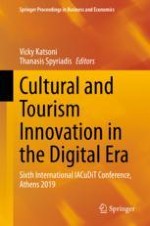2020 | OriginalPaper | Chapter
Storytelling as a Value Co-creation Instrument for Matera European Capital of Culture 2019
Authors : Nicolaia Iaffaldano, Sonia Ferrari
Published in: Cultural and Tourism Innovation in the Digital Era
Publisher: Springer International Publishing
Activate our intelligent search to find suitable subject content or patents.
Select sections of text to find matching patents with Artificial Intelligence. powered by
Select sections of text to find additional relevant content using AI-assisted search. powered by
